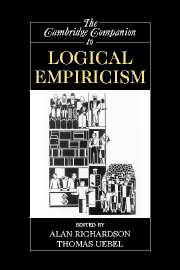Book contents
- Frontmatter
- Introduction
- Part I The Historical Context of Logical Empiricism
- 1 The Vienna Circle: Context, Profile, and Development
- 2 The Society for Empirical/Scientific Philosophy
- 3 From “the Life of the Present” to the “Icy Slopes of Logic”: Logical Empiricism, the Unity of Science Movement, and the Cold War
- Part II Logical Empiricism: Issues in General Philosophy of Science
- Part III Logical Empiricism and the Philosophy of the Special Sciences
- Part IV Logical Empiricism and its Critics
- Bibliography
- Index
- Series List
3 - From “the Life of the Present” to the “Icy Slopes of Logic”: Logical Empiricism, the Unity of Science Movement, and the Cold War
from Part I - The Historical Context of Logical Empiricism
Published online by Cambridge University Press: 28 January 2008
- Frontmatter
- Introduction
- Part I The Historical Context of Logical Empiricism
- 1 The Vienna Circle: Context, Profile, and Development
- 2 The Society for Empirical/Scientific Philosophy
- 3 From “the Life of the Present” to the “Icy Slopes of Logic”: Logical Empiricism, the Unity of Science Movement, and the Cold War
- Part II Logical Empiricism: Issues in General Philosophy of Science
- Part III Logical Empiricism and the Philosophy of the Special Sciences
- Part IV Logical Empiricism and its Critics
- Bibliography
- Index
- Series List
Summary
The scientific world-conception is close to the life of the present. Certainly it is threatened with hard struggles and hostility. Nevertheless there are many who do not despair but, in view of the present sociological situation, look forward with hope to the course of events to come. Of course not every single adherent of the scientific world-conception will be a fighter. Some glad of solitude, will lead a withdrawn existence on the icy slopes of logic.
From the Vienna Circle's manifesto, Wissenschaftliche Weltauffassung (Carnap, Hahn, and Neurath 1929/1973, 317)Logical empiricism of the 1930s was quite different from logical empiricism as it thrived in the 1950s. This later version is better known in part because it was codified by Thomas Kuhn's influential book The Structure of Scientific Revolutions (1962). Kuhn attacked “that image of science by which we are now possessed” (1962, 1) - an image of theories as logically transparent structures reaching from observations to abstract theory and changing in time by acquiring or modifying concepts and statements. This image of science went hand in hand with logical empiricism's interests in the logical structure of theory and procedures such as explanation and confirmation.
Yet the project that Kuhn attacked was itself very young. Kuhn wrote Structure in the late 1950s after a transformation had taken place, specifically, a narrowing in the scope, of the values and goals of logical empiricism. For Kuhn, logical empiricism was a philosophy of science concerned mainly with logic and using logic to understand science.
- Type
- Chapter
- Information
- The Cambridge Companion to Logical Empiricism , pp. 58 - 88Publisher: Cambridge University PressPrint publication year: 2007
- 9
- Cited by



